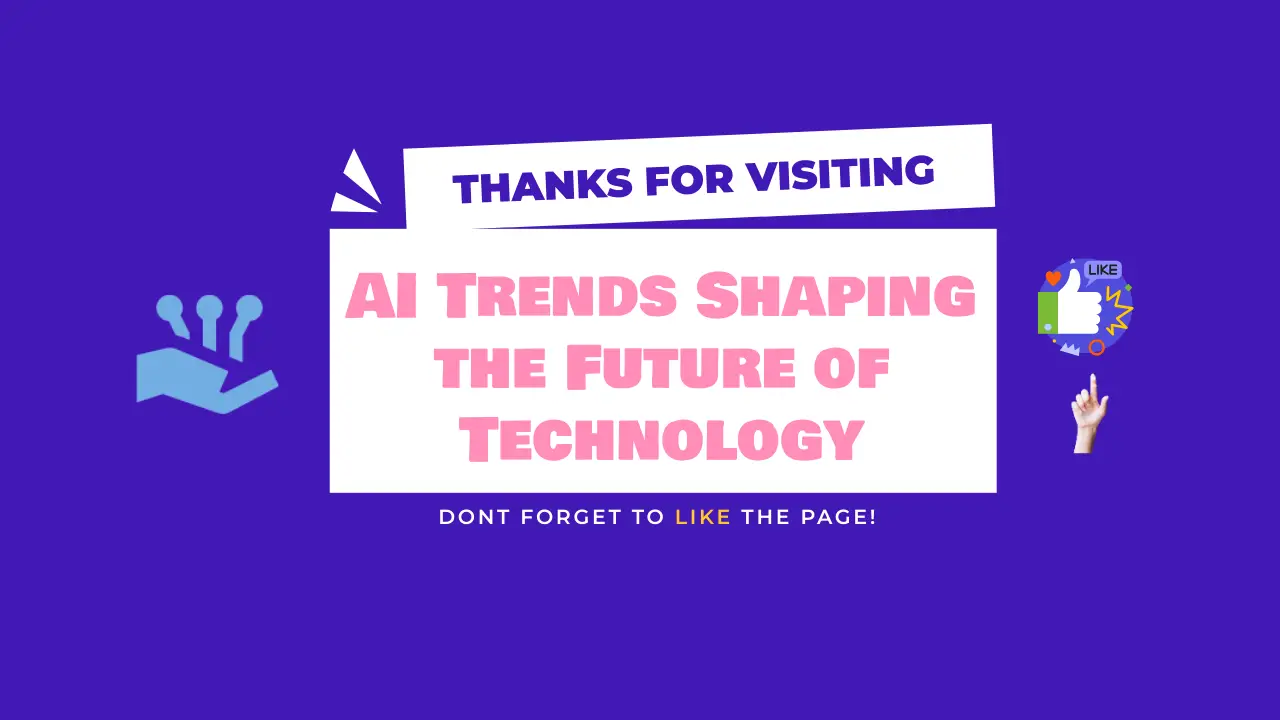AI Trends Shaping the Future of Technology

Artificial Intelligence (AI) is no longer a futuristic concept; it’s a transformative force that is already reshaping the landscape of technology. From healthcare to finance, entertainment to transportation, AI is making significant strides in enhancing capabilities, improving efficiency, and unlocking new possibilities. In this article, we explore some of the most influential AI trends that are shaping the future of technology.
1. Generative AI: Redefining Creativity
Generative AI refers to algorithms capable of creating new content, whether it be text, images, music, or even video. Tools like OpenAI’s GPT-4 and DALL·E have already revolutionized content creation. This technology has profound implications for industries like entertainment, marketing, and design. Instead of simply automating tasks, generative AI enables machines to act as co-creators, offering innovative ways for humans to express creativity and develop new ideas.
Generative AI can significantly reduce the time spent on ideation, prototype development, and content production. In marketing, for example, AI tools are already generating personalized advertisements and social media posts, providing businesses with tailored messaging that resonates with individual customers.
2. AI-Powered Automation: Transforming Industries
Automation powered by AI continues to transform industries by making processes faster, more accurate, and cost-effective. In sectors like manufacturing, logistics, and even healthcare, AI is streamlining workflows, reducing human error, and optimizing operations.
Robotic Process Automation (RPA), combined with AI, allows businesses to automate repetitive tasks that once required human intervention, such as data entry or customer service inquiries. By integrating AI into automation, companies are also enabling machines to make more informed decisions based on data patterns, which results in increased productivity and operational efficiency.
3. AI in Healthcare: Revolutionizing Diagnosis and Treatment
The healthcare sector is experiencing a profound shift due to AI technologies. From diagnostics to personalized treatments, AI is playing an increasingly pivotal role in improving patient outcomes and reducing costs.
AI-powered tools, such as IBM Watson and Google's DeepMind, are enabling healthcare professionals to diagnose diseases with greater accuracy by analyzing large datasets, including medical imaging, electronic health records, and clinical studies. Machine learning algorithms can detect patterns that are often invisible to the human eye, helping to identify conditions early on and improve treatment efficacy.
In addition, AI is being used to personalize patient care. By analyzing an individual’s genetic information, medical history, and lifestyle factors, AI can help doctors tailor treatments that are more effective and better suited to each patient’s unique needs.
4. AI in Autonomous Vehicles: Shaping the Future of Transportation
The development of autonomous vehicles is one of the most talked-about applications of AI. Self-driving cars, trucks, and drones are set to revolutionize the transportation industry by improving safety, reducing traffic congestion, and lowering environmental impact.
AI-powered systems enable autonomous vehicles to process real-time data from sensors, cameras, and other inputs to make split-second decisions, such as detecting obstacles, adjusting speed, and following traffic rules. Companies like Tesla, Waymo, and Uber are already testing and deploying autonomous vehicles, with the goal of reducing accidents caused by human error and creating more sustainable transportation solutions.
5. Ethical AI and Transparency: Addressing Concerns
As AI technologies become more embedded in everyday life, ethical considerations and transparency are critical. Issues like data privacy, algorithmic bias, and the potential for AI to perpetuate existing inequalities are gaining attention.
Governments, tech companies, and researchers are focusing on developing frameworks and guidelines to ensure AI systems are fair, accountable, and transparent. Efforts to create explainable AI (XAI) are also underway, allowing people to better understand how AI systems make decisions, which is essential for building trust and ensuring ethical practices in AI deployment.
6. AI and the Future of Work: Augmenting Human Capabilities
Rather than replacing jobs, AI is increasingly seen as a tool that can augment human capabilities and create new opportunities. AI is enabling workers to focus on more strategic and creative tasks while automating routine processes.
For example, AI in customer service chatbots can handle basic inquiries, freeing up human agents to deal with more complex issues. In fields like finance, AI can analyze market trends and provide actionable insights to help professionals make better investment decisions. As AI continues to evolve, new jobs and skills will emerge, creating a demand for workers with expertise in AI, machine learning, and data science.
7. AI and Data Privacy: Enhancing Security
As the use of AI increases, so does the importance of securing sensitive data. AI systems often rely on vast amounts of data to function, and ensuring that this data is handled responsibly is a key challenge.
AI can be used to improve cybersecurity by detecting vulnerabilities and identifying potential threats in real-time. Machine learning algorithms can recognize patterns in network activity, helping organizations detect cyberattacks faster than traditional security methods. Moreover, AI is playing a role in enhancing data privacy by enabling techniques like differential privacy, which helps protect individual information while still allowing for meaningful data analysis.
Conclusion: The Road Ahead for AI
AI is undoubtedly one of the most disruptive forces in technology today. The trends outlined above demonstrate that AI’s impact is only set to grow in the coming years. While the opportunities for innovation are vast, challenges related to ethics, transparency, and job displacement will need to be addressed. As AI continues to advance, it will undoubtedly redefine how we live, work, and interact with technology, creating a future that is both exciting and transformative.
The ongoing evolution of AI is a testament to the power of human ingenuity. As new breakthroughs are made and technologies are refined, we can expect AI to continue playing a central role in shaping the future of technology for years to come.